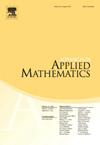块计数序列并非纯粹的形态序列
IF 1
3区 数学
Q3 MATHEMATICS, APPLIED
引用次数: 0
摘要
设 m 是大于 1 的正整数,w 是 {0,1,⋯,m-1} 上的有限词,am;w(n) 表示词 w 在非负整数 n 的 m 展开中出现的次数(mod m)。在本文中,我们提出了一种生成所有序列 (am;w(n))n∈N 的高效算法;然后,假设 m 是素数,我们证明除了满足 |w|=1 和 w≠0 的词 w 之外,所有这些序列都是 m-Uniformly 的,但不是纯形态的;最后,在与前面相同的 m 假设下,我们证明幂级数∑i=0∞am;w(n)tn 是 Fm(t) 上 m 阶代数。本文章由计算机程序翻译,如有差异,请以英文原文为准。
Block-counting sequences are not purely morphic
Let m be a positive integer larger than 1, w be a finite word over and represent the number of occurrences of the word w in the m-expansion of the non-negative integer n (mod m). In this article, we present an efficient algorithm for generating all sequences ; then, assuming that m is a prime number, we prove that all these sequences are m-uniformly but not purely morphic, except for words w satisfying and ; finally, under the same assumption of m as before, we prove that the power series is algebraic of degree m over .
求助全文
通过发布文献求助,成功后即可免费获取论文全文。
去求助
来源期刊

Advances in Applied Mathematics
数学-应用数学
CiteScore
2.00
自引率
9.10%
发文量
88
审稿时长
85 days
期刊介绍:
Interdisciplinary in its coverage, Advances in Applied Mathematics is dedicated to the publication of original and survey articles on rigorous methods and results in applied mathematics. The journal features articles on discrete mathematics, discrete probability theory, theoretical statistics, mathematical biology and bioinformatics, applied commutative algebra and algebraic geometry, convexity theory, experimental mathematics, theoretical computer science, and other areas.
Emphasizing papers that represent a substantial mathematical advance in their field, the journal is an excellent source of current information for mathematicians, computer scientists, applied mathematicians, physicists, statisticians, and biologists. Over the past ten years, Advances in Applied Mathematics has published research papers written by many of the foremost mathematicians of our time.
 求助内容:
求助内容: 应助结果提醒方式:
应助结果提醒方式:


